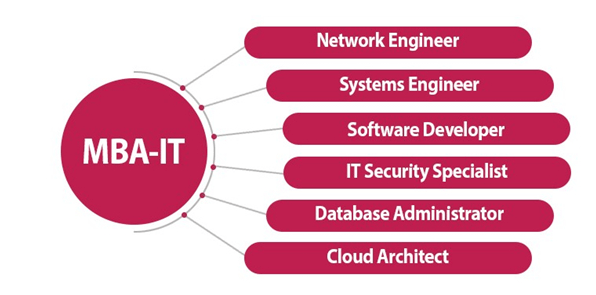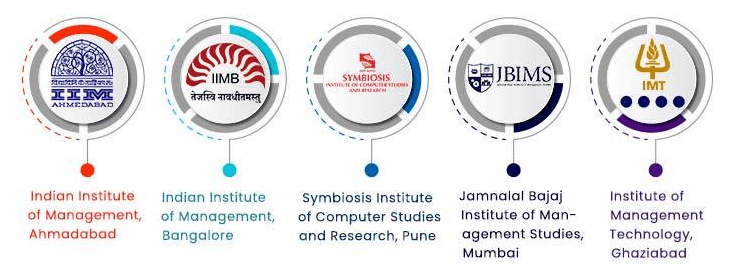
- Course Overview
- Need for IT Management
- Subjects Covered
- Top Colleges in India
- Eligibility Criteria
- Admission Process
- Career Opportunities
- Salary Packages
Course Overview
IT Management is a multidisciplinary field that equips students with the skills and knowledge needed to manage and oversee an organization’s information technology infrastructure effectively. This course combines technical expertise with managerial principles, preparing professionals to strategically implement, coordinate, and maintain technology solutions that support and enhance business objectives. The main goal of IT Management education is to enable students to address complex technological challenges while ensuring that IT operations are closely aligned with the overall goals of the organization. The curriculum in IT Management is comprehensive, covering a wide range of topics. These include systems development, data management, network administration, cybersecurity, and business process optimization. Alongside these technical subjects, students also gain foundational business knowledge, including finance, marketing, and strategic planning. This blend of technical and business education helps students understand how technology impacts organizational performance and how it can be leveraged to gain competitive advantage. Beyond technical skills, the course emphasizes leadership development, teaching students how to manage IT teams, lead projects, and communicate effectively with both technical staff and non-technical stakeholders. Project management methodologies and change management principles are often part of the syllabus, helping students to ensure smooth IT operations and successful project delivery. Graduates of IT Management programs are well-prepared to work in various industries, managing IT infrastructure, supporting business goals, and driving innovation. Their ability to bridge the gap between technology and business makes them valuable assets in today’s fast-evolving digital landscape.
To Explore PMP in Depth, Check Out Our Comprehensive PMP Certification Training To Gain Insights From Our Experts!
Need for IT Management
In today’s digital age, businesses heavily depend on Information Technology (IT) to operate efficiently and stay competitive. As organizations increasingly adopt technology to boost productivity, streamline processes, and enhance decision-making, the demand for skilled IT management professionals has grown significantly. Effective IT management ensures that technology resources are utilized efficiently, securely, and in alignment with organizational goals, making it a critical function in any modern business. IT managers play a vital role in overseeing the implementation, maintenance, and optimization of IT infrastructure. They ensure that hardware, software, and networks operate smoothly and support business activities without disruption. Integrating technology solutions with core business operations is another key responsibility, allowing companies to leverage IT for improved workflows and better customer experiences. Security is a top priority in IT management, with managers tasked to protect sensitive data and ensure compliance with industry regulations and standards. This involves implementing robust cybersecurity measures and regularly updating policies to mitigate risks. Additionally, IT managers focus on optimizing technology investments, making sure resources are allocated effectively to generate maximum value and avoid unnecessary costs.

As technology continues to evolve rapidly, IT management professionals must stay current with emerging trends such as cloud computing, cybersecurity challenges, and digital transformation strategies. Their ability to adapt and guide organizations through technological changes ensures businesses remain agile and resilient in a constantly shifting landscape. Overall, IT management is indispensable for organizations striving to harness technology’s full potential and maintain a competitive edge in the digital era.
Subjects Covered
- Introduction to IT Management: This foundational course covers the basics of IT management, including its importance, role in business, and the alignment between IT and business strategies. Students are introduced to the global IT industry and its impact on business operations.
- Project Management: Students learn how to manage IT projects, including planning, scheduling, budgeting, resource allocation, and risk management. This subject introduces tools like Gantt charts, project management software, and Agile methodologies.
- Systems Analysis and Design: This course teaches how to analyze business problems and design IT solutions. Students learn about systems development life cycles (SDLC), database design, and the role of business analysts in creating software and hardware systems.
- Database Management Systems: Students explore the design, development, and management of databases. Key topics include relational databases, SQL, data warehousing, and big data technologies.
- Network Management: This subject covers the principles of networking, network design, management, and security. Students gain practical knowledge of managing local area networks (LANs), wide area networks (WANs), and cloud networks.
- IT Infrastructure and Operations Management: Students are introduced to the concepts of managing and maintaining the hardware and software that make up an organization’s IT infrastructure. Topics include data centers, servers, cloud services, and IT service management (ITSM).
- Cybersecurity: This course focuses on protecting systems, networks, and data from cyber threats. Topics include encryption, network security protocols, firewalls, and compliance with security standards.
- Indian Institute of Management (IIM), Ahmedabad Known for its advanced curriculum and industry connections, IIM offers an executive program in IT management that focuses on leadership and strategic decision-making in the IT industry.
- Indian School of Business (ISB), Hyderabad ISB offers a Post Graduate Program in Management with a focus on IT and digital transformation, combining business knowledge with IT skills for senior management roles.
- XLRI Xavier School of Management, Jamshedpur XLRI offers an Executive Program in IT and management that provides professionals with a solid foundation in both technology and business practices.
- National Institute of Industrial Engineering (NITIE), Mumbai NITIE offers a well-recognized course in Industrial Engineering with a focus on IT and systems management, preparing students for roles in operations and IT management.
- Symbiosis Institute of Business Management (SIBM), Pune SIBM offers a post-graduate program in business management with a specialization in IT management, helping students gain the necessary skills to manage IT projects in various sectors.
- Tata Institute of Social Sciences (TISS), Mumbai TISS provides a comprehensive program in technology management, focusing on managing IT within social enterprises, non-profits, and corporate organizations.
- Application Submission: Candidates must fill out the application form available on the college’s official website, providing accurate personal, academic, and professional information.
- Entrance Exam: After applying, candidates are usually required to appear for an entrance exam such as CAT, GMAT, or a university-specific test, which evaluates aptitude in areas like quantitative ability, logical reasoning, and verbal skills.
- Group Discussion and Personal Interview (GDPI): Shortlisted applicants are invited to participate in a group discussion and personal interview to assess their communication, analytical thinking, leadership potential, and understanding of IT trends.
- Final Selection: Institutes evaluate candidates based on entrance exam scores, GDPI performance, academic records, and often work experience and extracurricular achievements before offering final admission.
- Document Verification: Selected candidates must undergo a verification process, submitting original academic transcripts, ID proof, entrance test scores, and other required documents to confirm eligibility.
- Offer Acceptance and Fee Payment: Once the admission offer is made, candidates need to formally accept the offer by paying the admission fee within a specified deadline to secure their seat.
- Orientation and Enrollment: Admitted students are required to attend an orientation session, where they are introduced to the program structure, faculty, and academic expectations, officially marking the start of the course.
Are You Preparing for PMP Jobs? Check Out ACTE’s Project Management Interview Questions & Answer to Boost Your Preparation!
Top Colleges in India

Eligibility Criteria
Eligibility criteria for IT Management programs vary depending on the level of study and the institution offering the course, but generally share common requirements. For undergraduate programs in IT Management or related fields, candidates typically need to have completed their higher secondary education (12th grade or equivalent) with a strong background in science, mathematics, or computer-related subjects. Many institutions require minimum marks or grades, often around 50-60%, to qualify for admission. Some universities may also conduct entrance exams or consider national-level test scores as part of their selection process. For postgraduate programs, such as a Master’s in IT Management or an MBA with a specialization in IT, applicants usually need to have a relevant bachelor’s degree from a recognized university. This degree could be in information technology, computer science, engineering, business administration, or other related disciplines. Work experience in IT or management is often preferred and sometimes mandatory, especially for executive programs. Many institutions require candidates to submit valid scores from standardized tests like the GMAT, GRE, or equivalent entrance exams. In addition to academic qualifications, admission committees often look for soft skills such as problem-solving ability, leadership potential, and effective communication. Some programs may require letters of recommendation, a statement of purpose, and personal interviews or group discussions to assess a candidate’s suitability. Overall, eligibility criteria aim to ensure that candidates possess the foundational knowledge and skills necessary to succeed in the multidisciplinary field of IT Management. Meeting these requirements helps prepare students for the rigorous curriculum and equips them to handle the technical and managerial challenges in this evolving industry.
Admission Process
Are You Considering Pursuing a Master’s Degree in PMP? Enroll in the PMP Masters Program Training Course Today!
Career Opportunities
Graduates of IT Management courses enjoy a diverse range of career opportunities across various industries, reflecting the growing importance of technology in business operations. One common role is that of an IT Project Manager, who is responsible for planning, executing, and closing technology projects. They ensure projects are completed on time, within budget, and meet the defined objectives, coordinating between technical teams and stakeholders. Another key position is the IT Director, who oversees the entire IT department. This role involves aligning IT operations with the company’s strategic goals, managing resources, and ensuring that technology supports overall business growth and efficiency. In larger organizations, the Chief Information Officer (CIO) holds a senior executive role, responsible for shaping the technology vision and strategy, driving innovation, and managing the IT infrastructure at a high level. Business Analysts play an important role in bridging the gap between business needs and IT solutions. They analyze business processes, identify areas for improvement, and recommend technology implementations to enhance productivity and streamline operations. Cybersecurity Analysts focus on protecting an organization’s digital assets by developing and enforcing security protocols to defend against cyber threats and data breaches. Cloud Solutions Architects specialize in designing and implementing cloud-based systems that are scalable, reliable, and secure, helping businesses transition to modern computing environments. Data Analysts or Data Scientists work with large volumes of data, employing statistical and machine learning techniques to extract actionable insights that drive better decision-making. Overall, IT Management graduates have ample opportunities to build rewarding careers that combine technical expertise with strategic business understanding, making them valuable assets in today’s technology-driven world.
Are You Interested in Learning More About PMP? Sign Up For Our PMP Certification Training Today!
Salary Packages
IT Management professionals can expect competitive salary packages that vary depending on their specific role, level of experience, industry, and geographical location. For entry to mid-level roles such as IT Project Manager, salaries typically range between ₹8 to ₹15 lakhs per annum (LPA). These professionals are responsible for managing technology projects from start to finish, and their pay often reflects the complexity and scale of the projects they handle. At higher management levels, the compensation increases significantly. IT Directors, who oversee entire IT departments and align technology functions with business objectives, generally earn between ₹20 to ₹30 LPA. Chief Information Officers (CIOs), holding senior executive positions responsible for an organization’s overall technology strategy, can command salaries ranging from ₹25 to ₹50 LPA or more, especially in large multinational companies or technology-driven industries. Other roles also offer attractive pay scales. Business Analysts, who work to align IT systems with business needs, typically earn between ₹6 and ₹12 LPA, while Cybersecurity Analysts focused on protecting organizational data and systems can expect salaries in the ₹7 to ₹18 LPA range. Cloud Solutions Architects, who design and implement scalable and secure cloud infrastructures, generally earn between ₹12 and ₹22 LPA. It is important to note that salaries tend to grow substantially with experience, additional certifications, and leadership responsibilities. Working in multinational organizations or in tech hubs often offers higher compensation due to the demand for skilled IT Management professionals. Overall, the IT Management field presents lucrative financial prospects, making it an appealing career choice for those with a passion for technology and business.





